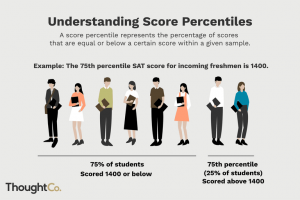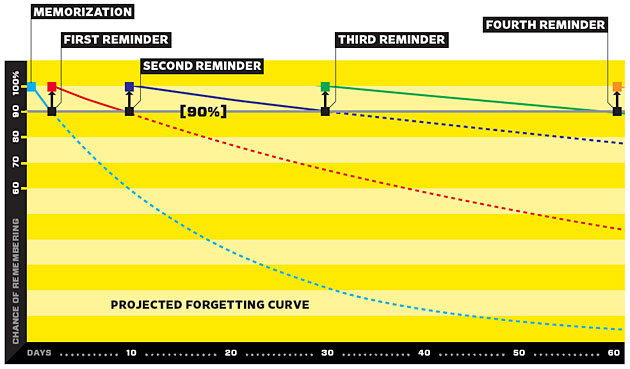How do I get a good GRE score for graduate school?
This post originally published on the 21st Night blog. 21st Night is a tool I developed to help students keep track of their progress and consistently improve on their exams, including the GRE.
Table of Contents
Ah, grad school.
If you have aspirations of getting into graduate school, we know how daunting the application process can be.
A big part of the grad school application process is crossing the GRE mountain – a long, frustrating, and somewhat perplexing journey for most.

Imagine the GRE waiting at the other end of the path.
There’s no doubt that GRE test-takers work hard. But the GRE is a highly specific, intensive exam that requires a strategic study approach and extreme test preparation.
While there’s no secret sauce or magic bullet to cracking the test, one general principle holds true: the smarter you work, the more results you’ll reap.
What’s a good GRE score?
Unfortunately, there’s no straight answer to this question. Successful GRE scores vary from school to school, and from program to program – a good GRE score for a Ph.D. engineering program at MIT is 162 Verbal/167 Quant, while the average student earning M.A. in psychology from Ohio State University has a 162 Verbal/ 158 Quant.
It’s important to do your research depending on what kind of program and institute you’re aiming for. Top schools will, unsurprisingly, be more demanding.
Keep in mind that GRE score statistics will always require a little bit of interpretation from your end.

You need to be as careful about interpreting average GRE scores as this clipart detective is about interpreting a question mark.
Average GRE scores, for instance, differ from GRE cutoff scores – just because you meet an average score doesn’t necessarily mean you’ll get accepted. Cutoff scores, on the other hand, represent the minimum score you’ll need in order for an admissions team to even consider you.
It’s equally important to look at which population a GRE statistic applies to. For instance, does the number relate to all applicants, or admitted students only?
Not all schools will provide clear-cut guidance about how they approach GRE scores, so sometimes all you can do is deduce what would be a good score.
You can do this by carefully looking at their average GRE score for their admitted students.
My score isn’t enough for my target school. Should I retake the GRE?
In an ideal world, admissions teams should judge you holistically and not reduce your application to a single score.
And this is indeed what they will tell you – but do they really practice what they preach?
It’s not impossible to enter a program where you don’t have a high score or don’t meet the minimum GRE requirement, but the reality is that it can be very challenging.
Unless you can pen a life-changing personal statement, have the absolute best recommendations, and/or showcase a considerable amount of high-quality work experience or extracurriculars, you’re better off simply retaking the GRE.

Like if you’re Michael Jordan, you probably have an interesting enough story that you don’t have to retake the GRE.
If you’re worried about the admissions team penalizing you for doing this, don’t be. It’s an accepted way of trying to get into a target program, and universities understand that it’s sometimes necessary.
There are limits to how often you can retake the GRE, though. There should be a 21-day gap between tests, and, within a year, you can sit for the GRE only five times.
This means that any re-attempt should be your best possible one. After all, you want to make sure that all the time, money, and energy you spend were not in vain!
Should I keep or cancel my GRE score?
At the end of every GRE test, ETS presents you with this question: do you want to keep or cancel your score?
It’s a deceptively simple question. And if you felt you just didn’t do a good job, cancelling can feel tempting.
Don’t make the impulsive decision to cancel your score based on the surge of anxiety and exhaustion you’re probably feeling right after completing the GRE.
It’s risky, and here’s why: unless you went into the exam with zero prep and a no-can-do attitude, you should already have a good chance of getting an acceptable score.
Do you really want to put your efforts down the drain? We hope not!

Don’t flush your GRE efforts down the drain by cancelling scores.
ETS cunningly does not allow you to see your score before cancelling it. And if you felt you didn’t do well on the quantitative section but aced the others, you still can’t selectively cancel scores for each section.
So unless you felt you did catastrophically, exceptionally bad on the test, or you’re psychic and you know your performance was unsalvageable, keep your score!
What GRE score do I need for graduate school?
The best (and easiest) way to answer this question is to visit the admissions webpage for your desired program(s).
Often times, there will be an indicator regarding what would be an acceptable GRE score – whether that is in the form of a cut-off, average, or even median scores from past students or applicants.
Merge this information together to understand your minimum required GRE score for admission, and set your own personal score goal for each of the verbal, quantitative, and analytical writing sections.
It’s a good idea to set your target a little higher than it needs to be. This way, you’ll be working smart – and providing yourself with a safety net for the actual test.
Keep in mind that admissions departments look at GRE percentiles too – in fact, some would say they’re much more important than your raw score.
Percentile rankings can look confusing but it really doesn’t need to be. All it tells you is how well you did relative to other test-takers.

Percentiles explained by a graphic from ThoughtCo.
Scoring around the 75th percentile on all three sections is typically a good target, because it tells the admissions team you outperformed 75% of the test-takers. The more competitive a program is, the higher the percentile rank you should aim to beat.
Your target scores should take into account the type of program as well. Remember, the whole point of standardized testing is to evaluate a candidate’s potential to succeed in a particular program.
It makes sense, then, that a grad program that weighs heavily on math skills will evaluate your quantitative reasoning score more carefully compared to other sections. A humanities program where you’ll need to write a lot to succeed, on the other hand, won’t mind if your quantitative score is relatively low.
Of course, this doesn’t mean you should throw GRE math out of the window, but what it does tell you is where your study efforts should be directed in order to get the best possible outcome.
Why didn’t I perform well on my actual GRE test?
We know how frustrating it can be to put in hundreds of hours into GRE prep only to end up with a lackluster score. If this is you, don’t fret.
The game’s not over yet! There are three big reasons why you got a bad GRE score, and all three are fully solvable.
First, examine what kind of study methods or techniques you were using. Inadequate or ineffective study methods is probably the number one reason you scored worse than you expected.
If you approached your studying in a haphazard way, spent hours staring at a textbook instead of actively processing key concepts, and tried to cram without thinking about how you’re going to retain it all in three months’ time for the actual test, your study strategy unfortunately worked against you.
A spaced repetition learning technique is absolutely vital to help you remember everything you learn for the GRE. The GRE is a test where you have to remember a ton of complex and varied information items – so, simply put: the better your memory, the better your score will be.
If you don’t know what spaced repetition is, it’s when you introduce time intervals in between studying and revisiting a particular concept or topic.
So instead of cramming in lots of information at once and praying your brain remembers it, you space it out, revisiting it every couple of days at first, for example, and then less frequently as time goes on.
By doing this, you’re overriding your brain’s natural process of forgetting and encouraging the formation of long-term memory connections, making the concept stick in your mind.

Second, think about whether you attempted to simulate or match your study conditions to the actual exam.
For example: did you take the time to familiarize yourself with the test format and exam tools, such as the on-screen calculator? Did you have a go at solving timed practice problems? Did you have a go at doing full four-hour practice tests closer to the exam date?
Discrepancies between test and study conditions is a big reason why many test-takers fail the GRE. Acing a reading comprehension question when you have all the time in the world to read, analyze, and choose your answer doesn’t mean much if you can’t do the same thing in about a minute’s time when your heart is racing and you’re battling against the clock during the actual test.
Your test-taking ability is a huge factor affecting your GRE score. To succeed, you will have to incorporate all of its test elements into your study plan.
Lastly, a low GRE score could be the result of simply not paying enough attention to your weaker areas and learning from your mistakes.
Not doing so means that you essentially wasted time going through material you were already good at, rather than lasering in on those that would have made a higher impact on your score.
Think of it like this: studying without any knowledge about what your difficult areas are and what kind of errors you make is a bit like running in a race blind. You have no idea where you’re going and where your studying will take you. And you’ll never reach the finish line – at least not in time.

Drinking blindfolded is hard enough. Now imagine running (or studying) blindfolded!
Practice tests can provide you with crucial insight into what kind of error patterns you display.
This in turn should inform what topics you focus on, based on questions such as: what are the topic areas you make errors on? How frequently? What kind of errors are they?
Doing this kind of error analysis will catapult your study success. You can do one manually via Excel or Google Sheets, but this will of course take time. Another option is to use an app or program that does this automatically for you, like 21st Night.
I’m retaking the GRE. How can I improve my study technique to boost my score?
Retaking is a simple fact of GRE life. What’s not so simple is actually making sure you improve your GRE score the second time around!
A big part of this, as we mentioned before, is making sure your studying and test prep revolves around a smart and efficient strategy.
The first thing you need to do is put together a GRE retake study plan.
Think about the three factors behind a low GRE score we spoke about – how could you incorporate them to make sure your studying is optimized?
If your study sessions include active recall and other memory-promoting aids such as spaced repetition, practice tests designed to simulate the actual GRE test (be sure to check out the free practice tests by ETS), and are informed by personal error analysis, you’re miles ahead of the average test-taker.
To further boost your chances of success, choose – and use – your GRE resources wisely.
There are so many GRE-related books, blogs, tutoring services, online sites, apps, and videos out there that it’s easy to fall into the trap of quantity over quality.
Apart from whatever textbook(s) you use as your study foundation, choose one good online resource as your personal self-study companion.
Ideally, this online resource should be versatile enough to support you with a range of question content, including vocabulary items, quantitative problems, and reading comprehension questions.
It should also promote learning retention via spaced repetition, and personalize the content you learn so you can quickly practice what you need to boost your score.
In short, whatever you choose as your GRE study companion should become a powerhouse for your studying: making it easier, smoother, faster, and more effective.
If you want a resource that can do all these things and more, you might want to consider the 21st Night app.

It uses a powerful spaced repetition and error analysis algorithm, meaning you’ll spend more time revisiting the concepts that are likely to be the stumbling blocks to your GRE score.
The result? Difficult topics you’ve learned two months ago stays as fresh in your mind as it would’ve been if you’d learned it today. It’s a pain-free solution to the information overload problem so many GRE candidates face.
21st Night also allows you to personalize your questions quickly and easily. Why is this important? So many apps out there, while useful in the sense they can promote learning, are ultimately ineffective study companions.
Pre-set flashcards (especially the free ones), for instance, can be super inefficient because you’re just wasting time doing questions you already know.
With 21st Night, you don’t need to spend hours trying to manually input or create personalized flashcards.
Have an existing word list from Quizlet or Anki? Simply import it. Have a question on your textbook that you can’t bother typing up? No problem – just take a picture using the 21st Night app.
As soon as you encounter a difficult problem or concept, capture it, load it into the app, and practice consistently. You don’t need to worry about analyzing your errors or spacing your learning – the app will take care of that for you.
The GRE is a challenging exam – no doubt about it. But it’s not an insurmountable mountain.
If you want to succeed, make sure your study strategy and resources are working for you rather than against you. Don’t run the race blind. Study smart, not hard. Your GRE score will thank you!